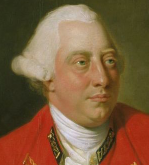Marx, George III and Trump
--

Resonating without Understanding
This famous quote is actually a synthesis of the very first sentence in Marx’s monograph «The Eighteenth Brumaire of Louis Bonaparte» published in 1852. The original statement is:
Hegel says somewhere that that great historic facts and personages recur twice. He forgot to add: “Once as tragedy, and again as farce.”
I first read this statement in the late ’70s, at a time when Marxism was fashionable (if somewhat dangerous to profess publicly) in Latin America.
The honest truth is I didn’t quite understand the precise meaning of the quote then.
I liked its wittiness and its invective tone. It had been enunciated by Marx and that was enough for my young self to acknowledge it.
Lost and Found

As I grew up Marxism faded away. In the late ’80s, Communism died an amazingly quick death. The cold war was suddenly over. A Bogotan true believer protested this new reality with a plaintive graffiti: «Communism lives on». A droll counterpart gave the sentence a final touch: «… by a miracle!».
After the debacle of Communism, I mostly forgot about Marx. And his quote.
Until I found Ian Martin’s delectable article The madness of King Trump, America’s sulky George III sequel.
In this masterpiece of whimsical journalism, Martin contrasts King George III and Donald Trump on how, precisely, history repeats itself. First as tragedy. Then as farce.
George III: Tragedy

George III is mostly remembered for being the king who “lost” America as well as for suffering from an acute form of what we nowadays call bipolar disorder.
After losing the American war of independence (and to his ministers’ chagrin) George III mulishly insisted on keeping Great Britain at war with the newly minted American republic. It took him many years to finally come to terms with the fact (as he eventually conceded to John Adams.) Losing America was a terrible personal tragedy for him and his knee-jerk reaction was a prolonged, stubborn denial.
Late in his life tragedy struck again in the form of recurrent mental illness. Beyond the illness itself, his woe must have been realizing, during his periods of lucidity, the relentlessness of his deterioration.
Trump: Farce

Outwardly, Trump would be remembered, too, for losing America in the 2020 elections and for appearing to suffer from a narcissistic disorder rendering him unable to accept defeat.
But that would be too superficial a reading; this time the story is farcical and the intention perverse.
Given how close percentages of the popular vote were, it is clear that Trump could have realistically expected to win. But he was always prepared to lose: his first threat of not accepting defeat for a second term dates back to the early days of his rule.
Many people now perceive Trump as a deranged president trying to conquer in the courts what he couldn’t win in the ballots. To them, Trump seems to be consumed by the delusion that he can rewrite the past.
But the reality is more sinister.
Statistics show a whopping 77% of Trump voters (over 51 million people!) believe the 2020 election was stolen from them.
Trump knows for a fact his shenanigans don’t stand a chance. He understands fully there’s no constitutional road for him to retain power.
His goal is to create a new, infuriated, massive voter base that truly believes they were deceived by the “deep state.”
This is his legacy for history, for a debased Republican party and -he may hope- for himself in 2024.
Yes: the honest truth is I didn’t quite understand the precise meaning of the quote then.
Now I do.
